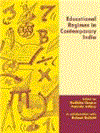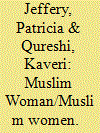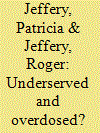|
|
|
Sort Order |
|
|
|
Items / Page
|
|
|
|
|
|
|
| Srl | Item |
| 1 |
ID:
120107


|
|
|
|
|
| Publication |
New Delhi, Sage Publication, 2005.
|
| Description |
346p.hbk
|
| Standard Number |
0761933484
|
|
|
|
|
|
|
|
|
|
|
|
Copies: C:1/I:0,R:0,Q:0
Circulation
| Accession# | Call# | Current Location | Status | Policy | Location |
| 057233 | 370.954/CHO 057233 | Main | On Shelf | General | |
|
|
|
|
| 2 |
ID:
050782


|
|
|
| 3 |
ID:
185576


|
|
|
|
|
| Summary/Abstract |
Images of the ‘Muslim Woman’ – passive, cloistered, and oppressed – have a long and inglorious history and have often been deployed in wider political debates in South Asia and beyond. The ground realities, however, tell a different story: there is no such person as the ‘Muslim Woman’ and this Special Issue presents papers that highlight the diversity of Muslim women’s lives within South Asia and among Muslim women of South Asian heritage in the diaspora. Muslim women often live in economic and political contexts that are hostile to their wellbeing and their experiences are also shot through with their own intersecting identities – region and residence, class, educational and employment opportunities, marital status, stage in the life course, and so forth. Our contributors focus on different arenas to highlight the diverse complexities faced by Muslim women grappling with the exigencies of daily life: engagements with the legal system in relation to marriage and inheritance; performing ‘claims work’ in order to obtain their entitlements from the state; involvement in income-generating work; and the impact of male outmigration on ‘left-behind’ wives.
|
|
|
|
|
|
|
|
|
|
|
|
|
|
|
|
| 4 |
ID:
130731


|
|
|
|
|
| Publication |
2014.
|
| Summary/Abstract |
The gendered character of India's fertility decline has attracted considerable academic attention. In this paper, I offer a critique of the arguments of some demographers about the linkages between dowry, daughter aversion and the marriage squeeze that predict that increasing shortages of marriageable women will result in declines in dowry. I argue that such economistic readings seriously oversimplify the complexities of marriage arrangement 'on the ground' in contemporary India. Further, whilst one aspect of dowry might relate to the supply and demand of brides and grooms, dowry and daughter aversion are not simply outcomes of demographics alone. First, marriage migration is crucial in understanding daughter aversion. Second, dowry is not just a matter of marriage and kinship practices. Dowry is a polyvalent institution that also connects with conspicuous display in status competition in a hierarchical society and with people's rising aspirations to possess consumer goods within the wider context of contemporary India's rapidly changing political economy. Crucially, marriage migration, status competition and consumerism do not necessarily push in the same direction as the demographics of the marriage squeeze might imply when it comes to dowry and daughter aversion.
|
|
|
|
|
|
|
|
|
|
|
|
|
|
|
|
| 5 |
ID:
106716


|
|
|
|
|
| Publication |
2011.
|
| Summary/Abstract |
During the 2000s, confirmed polio cases in India have been increasingly localised in Uttar Pradesh (UP) and Bihar, especially amongst Muslim children. Muslims have also been at the sharp end of the Pulse Polio Initiative (PPI) and the associated 'Underserved Strategy' designed to counter civilian resistance to the programme. Our critique of the PPI draws on long-term research in rural UP and focuses on the programme's socio-political implications. We discuss popular rumours about polio vaccine and official responses to resistance. Taking a longer term view of top-down single-issue public health programmes, we argue that Muslims in western UP, as a marginalised minority, have good reason to be suspicious of the PPI. Moreover, the PPI arguably reflects the agendas of global funders, not the priorities of local communities. Villagers - Hindu and Muslim alike - have repeatedly criticised government health services for failing to deal with the health issues that worry them most. Their concerns echo other critiques of the PPI, particularly the diversion of resources from other health-related activities that could address the social determinants of health and health inequalities.
|
|
|
|
|
|
|
|
|
|
|
|
|
|
|
|
|
|
|
|
|